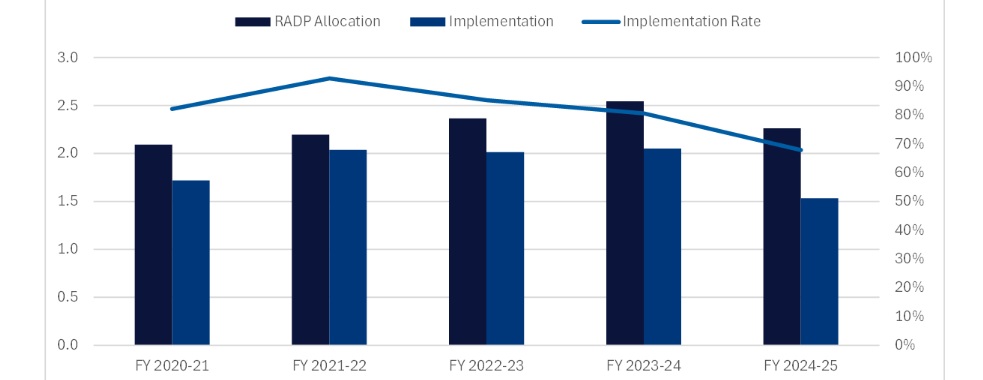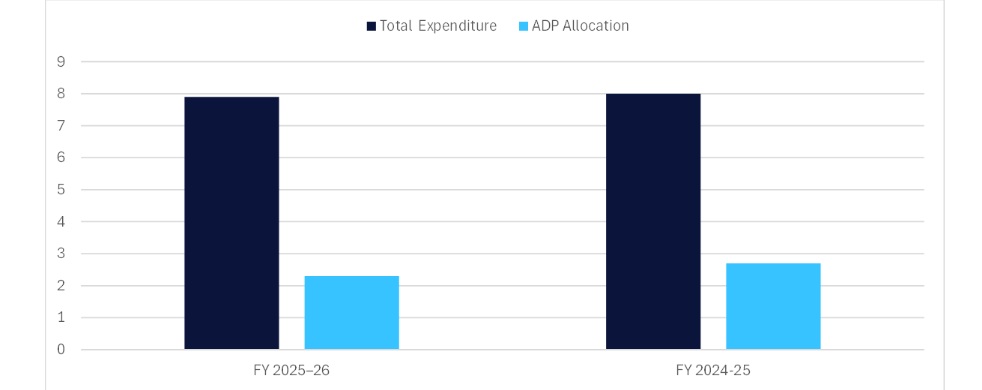In May 2025, the government of Bangladesh approved a Tk2.3tn ($18.4bn) Annual Development Program (ADP) for fiscal year 2025-26 (July 2025 to June 2026/FY25-26), compared to the allocation of Tk2.7tn under the original ADP FY24-25 (July 2024 to June 2025). Of the total, Tk1.4tn will come from domestic sources and Tk860bn from foreign aid. Overall, the balanced mix remains in line with the interim government’s broader fiscal goal of maintaining economic stability without increasing the debt burden, especially during ongoing political turmoil.
The ADP for FY25-26 covers a comprehensive plan for the government’s public investment strategy, focusing on socioeconomic development through prioritised and targeted spending. The ADP will span across thousands of projects, reflecting the government’s policy intent to balance infrastructure growth with sustainability and fiscal discipline. The ADP for FY25-26 continues the trend of rationalising project portfolios, following a politically turbulent period and economic constraints. The ADP emphasises fewer but more focused, results-oriented projects, particularly in critical sectors such as transport, energy, education, health, and agriculture. The government has identified 1,171 projects, comprising 993 investment projects, 99 technical assistance projects, 19 feasibility studies, and 60 self-financed initiatives, with each of the projects under the ADP having undergone scrutiny to ensure alignment with national priorities and Sustainable Development Goals. The ADP also includes detailed financial and physical progress tracking mechanisms. Furthermore, technical assistance projects have been included to strengthen planning, institutional capacity, and the readiness of larger infrastructure or policy-oriented interventions, ensuring that major investments are preceded by solid groundwork, risk assessment, and feasibility analysis.

Access deeper industry intelligence
Experience unmatched clarity with a single platform that combines unique data, AI, and human expertise.
Another major innovation in the FY25-26 ADP is the integration of climate finance and public-private partnerships (PPPs) projects into the main development planning framework. Around 228 projects have been marked under the Bangladesh Climate Change Trust Fund, reflecting a growing awareness of environmental resilience and sustainability. In addition, 79 projects are included under the PPP model, signalling a strategic move to attract private-sector investment and expertise for large-scale development without overburdening public finances. From bridge and road construction to rural electrification projects, the FY25-26 ADP attempts to reduce geographic disparities and foster inclusive growth.

Project implementation was low in FY24-25. This was attributed to major declines in development spending compared to FY23-24, amid the interim government’s decision to reevaluate, cut down, and withhold several projects, especially those taken up by the previous Sheikh Hasina administration. The regime changes in the country have massively hindered the implementation of several construction projects due to instability within the bureaucratic and development administration, leading to project directors and contractors terminating the projects. According to the Implementation Monitoring and Evaluation Division, in FY24-25, Tk909bn was spent from government funds, accounting for 67.3% of the total allocation. In contrast, in FY23-24, Tk1.2tn was spent from government funds, accounting for 76.37% of the total allocation.
The FY25-26 ADP places a strong emphasis on five key sectors: transport and communications, power and energy, education, housing and community facilities, and health, which together account for nearly 70% of the total allocation. The largest portion has gone to the transport and communications sector with an allocation of Tk589.7bn, followed by the power and energy sector with Tk323.9bn, the education sector with Tk285.6bn, the housing sector with Tk227.8bn, and the health sector with Tk181.5bn. Moreover, the allocation reflects the government’s strategy of reinforcing critical infrastructure, human capital development, and essential services while avoiding grandiose and politically risky mega-projects, except for the continuation of the Japan-funded Matarbari Deep Sea Port.
In terms of ministries and divisions, the local government division has received the highest allocation amounting to Tk361bn, followed by the Road Transport and Highways Division with an allocation of Tk323.3bn, the power division with Tk202.8bn, the secondary and higher education division with Tk136.3bn, the Science and Technology Ministry with Tk121.5bn, the health services division with Tk116.2bn, the Ministry of Primary and Mass Education with Tk114bn, the shipping ministry with Tk93.8bn, the water resources ministry with Tk84.9bn, the and Ministry of Railways received Tk77.1bn.

US Tariffs are shifting - will you react or anticipate?
Don’t let policy changes catch you off guard. Stay proactive with real-time data and expert analysis.
By GlobalDataIn the education sector, the Ministry of Primary and Mass Education will support major projects like the School Feeding Program and the Fourth Primary Education Development Program, which aim to address dropout rates, improve nutrition, and enhance access to quality primary education. The Secondary and Higher Education Division also received substantial funding for projects involving ICT integration, infrastructure expansion, and the modernisation of public colleges and universities. The FY25-26 ADP also includes allocations for the development of science education, IT-based learning, and digital classrooms.
In the health sector, the government has continued to invest in expanding public healthcare infrastructure. Some of the key projects under the FY25-26 ADP include the construction of new medical colleges and hospitals across several districts, burn and cancer units in major hospitals, and enhancements to medical waste management systems. The funding is also allocated for the development of specialised facilities such as dialysis centres and advanced diagnostic laboratories. The ADP has also allocated over Tk1tn for the continuation of construction works on the Rooppur Nuclear Power Plant project. The project includes the development of nuclear safety systems, power transmission facilities, and off-site infrastructure. The government is also investing in research facilities and science-focused educational institutions, aiming to promote long-term innovation capacity.



